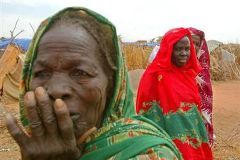Armed militia raises concern for any first refugees returning Darfur
By ELLEN KNICKMEYER, Associated Press Writer
GENEINA, Sudan, Sep 27, 2004 (AP) — Armed militiamen have surged into a border area near a western village where some of the first Darfur refugees attempting to return to their raided homes headed, U.N. security officials said Sunday, raising further concern about how quickly 1.4 million displaced Sudanese will be able to return home.
 U.N. authorities were sending a team to the area to try to assess any risk to the refugees, said West Darfur U.N. refugee security officer Sabir Mughal.
U.N. authorities were sending a team to the area to try to assess any risk to the refugees, said West Darfur U.N. refugee security officer Sabir Mughal.
Sudanese authorities, meeting U.N. High Commissioner for Refugees Ruud Lubbers in West Darfur province, told Lubbers they were calming the 19 months of bloodletting in Darfur. The region’s non-Arab African villagers and international leaders blame the crisis — which the United States has labeled genocide — largely on government-backed Arab militias known as Janjaweed.
Some of the nearly 200,000 refugees who had fled into neighboring Chad already were starting to come home, Social Affairs Minister Habib Mouktoun told Lubbers, “and we are welcoming them.”
But the armed militia movement reported by U.N. refugee security authorities around the border village of Abu Surug could further jeopardize efforts to convince refugees they can safely go home. “A few” refugees from Chad returned to the Abu Surug area a few days ago, and the still-unidentified militia moved in after them, Mughal said.
Sudan, Africa’s largest country, is under review by the U.N. Security Council for possible sanctions on its oil industry over what the United States, European Parliament and some others say is genocide by the government and Janjaweed — or Men on Horseback — in Darfur.
Violence broke out when two non-Arab Darfur movements took up arms in February 2003 against government installations, saying they wanted a bigger share of power and Sudan’s resources. More than 50,000 people have died during the crisis, which unleashed what the United Nations says is the world’s worst humanitarian crisis.
On Sunday, West Darfur Gov. Abdalla Sulieman Adam linked one of the rebel movements, the Justice and Equality Movement, to what the government says was a foiled coup plot Friday in Sudan’s capital, Khartoum.
The rebel movement was the armed wing of an opposition group, the Popular Congress Party, Adam said.
In Darfur, the Justice and Equality Movement “is trying to bring international intervention and overthrow the government,” Adam said after a weekend of stepped-up military patrol in Khartoum.
At Sudan’s western border, the U.N. report of militia movement threatened to be a first test of whether Darfur was safe again for its non-Arab African villagers.
Lubbers told reporters he saw improvement, but, asked if he thought it was safe for those who fled to go home, the refugee chief said it was not.
“We are not in a process of return,” Lubbers said at the Sudan government’s Riyad camp, outside the state capital. “We are in a process of reducing violence.”
Even at the camp, men and women said beatings, thefts and rapes took place on a daily or weekly basis whenever they ventured just beyond the edges.
Violence made any hope of return home out of the question, and transit to the safer, better-equipped internationally run refugee camps in Chad a dream, said Nosra Suliman Hakkar, a 40-year-old mother of seven whose husband disappeared when militia attacked her village nine months ago.
“If we leave the camp, we die,” Hakkar said.
U.N. security officials in Darfur cited other alleged instances of continuing unrest — including showing the photograph of a wounded and bandaged 2-year-old boy. Villagers said Janjaweed militia threw the boy into the flames of his home when they burned his village of Jebal Marra last week, Berhame Nagga, U.N. protection officer for West Darfur, said.
Nagga said he visited the burned village, and said the destruction did appear recent.
Sudan officials say they are doing everything to restore calm, including arresting what Adam, the governor, called “armed gangs” behind some attacks.
U.N. authorities are anxious to see peace restored enough to allowed Darfur’s people to return from within and outside the country — fearing, in part, rising tensions in Chad in the event of a new refugee flow.
Relief workers across the border in Chad say the Sudanese government is trying to dissuade Darfur’s people from crossing the border — telling them via radio campaigns and local chiefs that there is no food for them in Chad.
Refugees and relief workers also report Janjaweed patrols blocking any escape route between Darfur villages and the border with Chad.
“The last thing the Sudan government wants is a big flow of refugees, because that would be a clear indication that the attacks are continuing,” said Eduardo Cue, a spokesman for the U.N. relief agency’s operations here.
